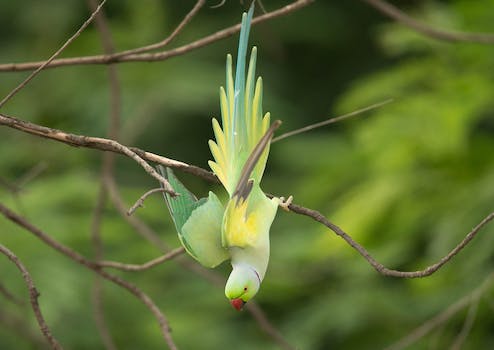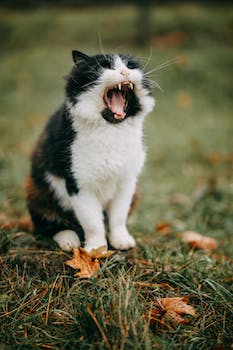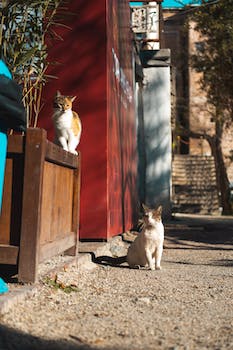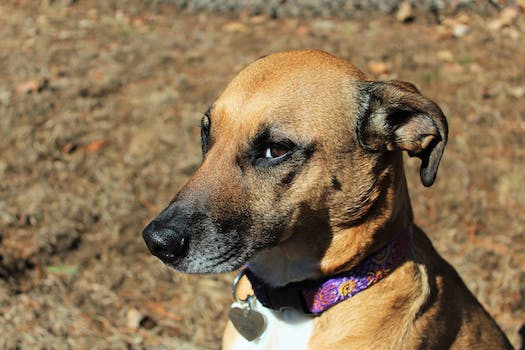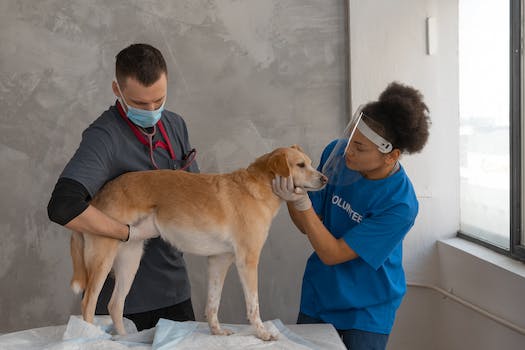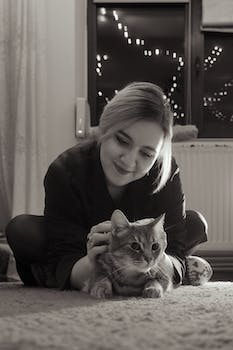

-
Table of Contents
"Revive their appetite, restore their vitality."
Introduction
Appetite loss in cats can be a concerning issue for pet owners. It is important to address this problem promptly to ensure the overall health and well-being of your feline companion. In this article, we will explore various strategies and solutions for dealing with appetite loss in cats, helping you understand potential causes and providing practical tips to encourage your cat to eat.
Understanding the Causes of Appetite Loss in Cats
Understanding the Causes of Appetite Loss in Cats
Appetite loss in cats can be a concerning issue for pet owners. Cats are known for their finicky eating habits, but when a cat consistently refuses to eat, it may be a sign of an underlying health problem. In order to effectively address appetite loss in cats, it is important to understand the potential causes.
One common cause of appetite loss in cats is dental problems. Cats rely on their teeth to chew their food, and if they are experiencing pain or discomfort in their mouth, they may avoid eating altogether. Dental issues such as gum disease, tooth decay, or broken teeth can all contribute to appetite loss. Regular dental check-ups and proper dental care can help prevent these problems and ensure that your cat's appetite remains healthy.
Another potential cause of appetite loss in cats is gastrointestinal issues. Cats can develop conditions such as gastritis, pancreatitis, or inflammatory bowel disease, which can all affect their appetite. These conditions can cause nausea, abdominal pain, and discomfort, making it difficult for cats to eat. If you suspect that your cat may be experiencing gastrointestinal issues, it is important to consult with a veterinarian who can diagnose and treat the underlying problem.
Stress and anxiety can also play a role in appetite loss in cats. Cats are sensitive creatures and changes in their environment or routine can cause them to feel stressed or anxious. This can lead to a decrease in appetite. Common stressors for cats include moving to a new home, the addition of a new pet or family member, or changes in their daily routine. Providing a calm and stable environment for your cat, along with plenty of mental and physical stimulation, can help alleviate stress and improve their appetite.
Certain medications can also cause appetite loss in cats. If your cat has recently started taking a new medication and you notice a decrease in their appetite, it is important to consult with your veterinarian. They may be able to adjust the dosage or switch to a different medication that does not have the same side effect.
Lastly, underlying medical conditions such as kidney disease, liver disease, or cancer can all contribute to appetite loss in cats. These conditions can affect the cat's overall health and well-being, leading to a decrease in appetite. It is important to have your cat regularly examined by a veterinarian to catch any potential health issues early on.
In conclusion, appetite loss in cats can be caused by a variety of factors. Dental problems, gastrointestinal issues, stress and anxiety, medications, and underlying medical conditions can all contribute to a decrease in appetite. Understanding the potential causes of appetite loss is the first step in finding a solution. If you notice that your cat is not eating as much as usual, it is important to consult with a veterinarian who can help diagnose and treat the underlying problem. By addressing the root cause of appetite loss, you can help ensure that your cat remains healthy and happy.
Effective Strategies for Stimulating a Cat's Appetite

Cats are known for their finicky eating habits, and it can be concerning for pet owners when their feline companions lose their appetite. Appetite loss in cats can be caused by a variety of factors, including illness, stress, or changes in their environment. However, there are effective strategies and solutions that can help stimulate a cat's appetite and ensure they are getting the nutrition they need.
One of the most important strategies for dealing with appetite loss in cats is to identify and address any underlying health issues. If your cat suddenly loses their appetite, it is crucial to consult with a veterinarian to rule out any medical conditions that may be causing the problem. Illnesses such as dental problems, gastrointestinal issues, or infections can all lead to a decreased appetite in cats. Once any underlying health issues are addressed, it becomes easier to stimulate their appetite.
Another effective strategy for stimulating a cat's appetite is to provide them with a variety of food options. Cats can quickly become bored with their food, so offering different flavors and textures can help pique their interest. Wet food, for example, tends to be more appealing to cats due to its stronger aroma and higher moisture content. Mixing in some wet food with their dry kibble or trying out different brands can help entice them to eat.
In addition to offering a variety of food options, it is essential to create a calm and stress-free environment for your cat during mealtime. Cats are sensitive creatures, and any changes or disruptions in their environment can cause them to lose their appetite. Ensure that their feeding area is quiet and free from any distractions. It may also be helpful to establish a routine for feeding, as cats thrive on consistency. Feeding them at the same time each day can help create a sense of security and encourage them to eat.
If your cat is still not showing interest in their food, there are several solutions that can be tried. One option is to warm up their food slightly, as the warmth can enhance the aroma and make it more enticing. However, be cautious not to make it too hot, as cats have sensitive tongues. Another solution is to hand-feed your cat small amounts of food. This can help create a positive association with eating and make mealtime more enjoyable for them. Additionally, using food puzzles or interactive toys can help stimulate their appetite by making mealtime a fun and engaging activity.
It is important to note that appetite loss in cats should not be ignored, as it can lead to serious health complications if left untreated. If your cat continues to show a lack of interest in food or experiences weight loss, it is crucial to seek veterinary attention promptly. Your veterinarian may recommend additional interventions, such as appetite stimulants or prescription diets, to help address the issue.
In conclusion, appetite loss in cats can be a concerning issue for pet owners. However, by implementing effective strategies and solutions, it is possible to stimulate a cat's appetite and ensure they are receiving the nutrition they need. Identifying and addressing any underlying health issues, providing a variety of food options, creating a calm environment, and trying different solutions such as warming up food or hand-feeding can all help encourage a cat to eat. Remember, if appetite loss persists, it is essential to consult with a veterinarian for further guidance and treatment.
Nutritional Solutions for Managing Appetite Loss in Cats
Nutritional Solutions for Managing Appetite Loss in Cats
Appetite loss in cats can be a concerning issue for pet owners. It can be caused by various factors, including illness, stress, or changes in the environment. When a cat refuses to eat, it can lead to weight loss and nutritional deficiencies. Therefore, it is crucial to address this problem promptly and find effective strategies to stimulate their appetite. In this article, we will explore some nutritional solutions for managing appetite loss in cats.
One of the first steps in dealing with appetite loss is to ensure that your cat is receiving a balanced and nutritious diet. High-quality commercial cat foods are formulated to provide all the essential nutrients that cats need. However, if your cat is experiencing appetite loss, you may need to consider alternative options. One option is to try different flavors or textures of cat food to entice your cat's interest. Some cats may prefer wet food over dry kibble, while others may prefer a mix of both. Experimenting with different options can help you find the right fit for your cat.
Another strategy to manage appetite loss is to offer small, frequent meals throughout the day. Instead of leaving a large bowl of food out all day, divide the daily portion into several smaller meals. This can help stimulate your cat's appetite and make mealtime more appealing. Additionally, warming the food slightly can enhance its aroma, making it more enticing for your cat.
If your cat still refuses to eat, you may need to consider adding some extra flavor to their meals. Adding a small amount of tuna juice or low-sodium chicken broth to their food can make it more appealing. However, it is important to note that these additions should be used sparingly and should not replace a balanced diet. They are meant to be temporary solutions to encourage your cat to eat.
In some cases, appetite loss in cats may be due to dental issues. Dental problems can make eating painful, leading to a decreased appetite. If you suspect dental problems, it is essential to have your cat's teeth examined by a veterinarian. They may recommend a dental cleaning or other treatments to address the issue. Once the dental problems are resolved, your cat's appetite should improve.
In addition to dietary changes, creating a stress-free environment for your cat can also help stimulate their appetite. Cats are sensitive creatures, and changes in their environment can cause stress and anxiety, leading to appetite loss. Providing a quiet and calm space for your cat, away from loud noises or other pets, can help reduce their stress levels. Additionally, engaging in interactive play sessions with your cat can help alleviate stress and increase their appetite.
If your cat's appetite loss persists despite your efforts, it is crucial to consult with a veterinarian. They can perform a thorough examination and run diagnostic tests to identify any underlying medical conditions that may be causing the appetite loss. In some cases, medication or additional treatments may be necessary to address the issue.
In conclusion, appetite loss in cats can be a challenging issue to manage. However, by implementing these nutritional solutions, you can help stimulate your cat's appetite and ensure they receive the necessary nutrients for their overall health and well-being. Remember to consult with a veterinarian if the appetite loss persists or if you suspect any underlying medical conditions. With patience and proper care, you can help your cat regain their appetite and thrive.
Q&A
1. What are some strategies for dealing with appetite loss in cats?
- Offer a variety of wet and dry food options.
- Warm up the food slightly to enhance its aroma.
- Feed smaller, more frequent meals.
- Ensure a calm and stress-free feeding environment.
- Consult with a veterinarian for potential underlying health issues.
2. Are there any solutions to stimulate a cat's appetite?
- Use food toppers or gravies to enhance the flavor of their meals.
- Offer highly palatable foods such as canned tuna or chicken baby food.
- Try hand-feeding or using interactive feeding toys.
- Provide a quiet and comfortable eating area away from distractions.
- Consult with a veterinarian for appetite-stimulating medications if necessary.
3. How can I encourage my cat to eat when they have a decreased appetite?
- Maintain a consistent feeding schedule.
- Warm up the food to make it more appealing.
- Offer small, frequent meals throughout the day.
- Ensure the food is fresh and of high quality.
- Consult with a veterinarian to rule out any underlying health issues.
Conclusion
In conclusion, there are several strategies and solutions for dealing with appetite loss in cats. These include offering a variety of palatable and nutritious food options, ensuring a stress-free environment, addressing any underlying medical conditions, and seeking veterinary advice if the appetite loss persists. It is important to monitor the cat's eating habits and consult with a veterinarian to determine the best course of action for maintaining their health and well-being.

